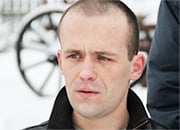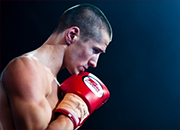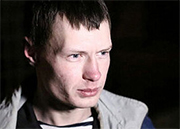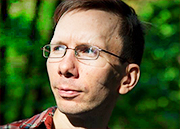The website charter97.org announced winners of the National Human Rights Award 2014
This year's winners of the Viktar Ivashkevich National Human Rights Award are:
Vasil Parfiankou

The life of Vasil Parfiankou is a demonstration of how dissidents are treated in Belarus. Parfiankou has been jailed three times in the last four years for his active citizenship.
The activist was initially arrested for participating in the post-election protests on December 19, 2010. Having spent almost a year in prison, the activist was released, but got a new prison term of 6 months for a picket of solidarity with other political prisoners. After the release, Parfiankou was arrested again and sent to the so called special rehabilitation centre. This seemingly neutral term hides a terrifying system of, in fact, concentration camps. Parfiankou was taken to a court after several months in the centre and sentenced to a year in a maximum security correctional facility for violating the rules of the so called preventive supervision. The political prisoner spent 90% of his term in a punishment cell in the correctional facility in Horki.
“I will fight for Belarus's freedom anyway,” Vasil Parfiankou says. He receives the award for personal courage.
Vital Hurkou

Muay Thai world champion Vital Hurkou is awarded for courage in creative work. He is idolised by many Belarusians not only due to his success in sport. He is an example of courage, unbending spirit and patriotism. Hurkou openly speaks for supporting freedom in Belarus. His hero is Kastus Kalinouski, his flag is white-red-white and his language is Belarusian.
The sportsman joined Siarhei Mikhalok's new band BRUTTO and performed the song with the prophetic title “We'll Win”.
Eduard Lobau

Young Front activist Eduard Lobau served the whole 4-year term of imprisonment. The opposition activist was arrested together with youth leader Zmitser Dashkevich as a result of a provocation on 18 December 2010 ahead of mass protests against the fraudulent presidential elections. In cruel and inhumane confinement conditions in Belarusian prisons one year is equal to three ones. Having withstood all ordeals, the young patriot still has a dream to serve in the army of free independent Belarus.
Belarusians have the right to protest, and the authorities fear it, the activist thinks. Eduard Lobau receives the award for personal courage.
Anton Tsialezhnikau

An activist of Zubr movement and leader of the Union to Support Democracy in Belarus in the early 2000s, Anton Tsialezhnikau is now a documentary movie director. His films Belarusian Resistance, Belarus under German Occupation, War Games, Damned and Forgotten remove the cover of the official lie from the history of Belarus. Tsialezhnikau obtained wide popularity for historical music videos for popular band Dzeciuki – Liasnya Braty, Khloptsy-Balakhoutsy. The director, the film crew and musicians were detained by the riot police as they were filming a music video. Anton Tsialezhnikau receives the award for courage in creative work.
The National Human Rights Award was founded by Charter’97 in 1998. In different years the award was granted to participants of a camp on Kastrychnitskaya Square of Minsk in March 2006; political prisonersAles Bialiatski, Aliaksandr Kazulin, Zmitser Dashkevich, Mikhail Marynich, Pavel Seviarynets, Mikalai Statkevich, Andrei Kim, Siarhei Parsiukevich, Uladzimir Yaromenak; first head of independent BelarusStanislau Shushkevich; activist of the Belarusian Independent Trade Union Alena Zakhozhaya; believers, who went on hunger strike to defend the New Life protestant church; Ivona Matsukevich, the head of the parish committee of St. Joseph’s church; human rights activists Valer Shchukin and Halina Yubko; wives of disappeared opposition leaders and a journalist Iryna Krasouskaya, Zinaida Hanchar, Svyatlana Zavadskaya; wife of the former political prisoner Tatsiana Klimava-Leanovich; People’s Artist of BelarusZinaida Bandarenka; opposition activist Uladzimir Plashchenka; defenders of the Kurapaty memorial complex; the creative association “Pahonya”; the Belarus Free Theatre; music bands N.R.M., Novaye Neba and Lyapis Trubetskoy with its leader Siarhei Mikhalok; Yakub Kolas Belarusian Humanities Lyceum closed down by the authorities; journalists Pavel Mazheika, Mikola Markevich, Viktar Ivashkevich, Liubou Luniova, Yuras Karmanau, Maryna Koktysh, Henadz Barbarych, Yulia Darashkevich and Tatsiana Novikava; human rights activist Yana Paliakova; trade union leader Henadz Fiadynich; Swedish pilotsTomas Mazetti, Per Cromwell, Hannah Frey; political prisoners convicted in the case of December 19; the initiative Vyzvalenne and other famous public figures, politicians and journalists.
Original: http://charter97.org/en/news/2014/12/31/133375/


